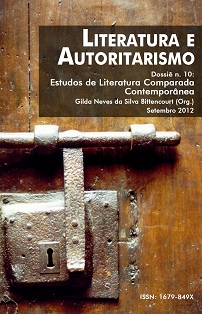The Vargas government and its implications for German-Brazilian literary production
DOI:
https://doi.org/10.5902/1679849X75392Keywords:
Nationalist campaign, Brazilian literature, German ImmigrationAbstract
The present paper aims to reflect upon the effects of the nationalist campaign during Vargas government depicted in Brazilian literature from the German immigrants’ perspective. During the period of Vargas's dictatorship, among other measures, all immigrants and their descendents in Brazil were forbidden to speak their language in public in a way to force them to integrate themselves into Brazilian culture. This determination affected German immigrants’ way of life, because many of them couldn’t Portuguese and, due to the fact that Brazil entered the war against Germany, the immigrants suffered attacks from Brazilian people. Trading houses, newspapers and other institutions - owned by Germans - were burned and associations were closed. Therefore, the relationships between Brazilians and Germans were troubled. Which are the effects of this period on Brazilian literature? What was published in literary works about this issue? How were German immigrants and their descendents portrayed in Brazilian literature before, during and after the nationalist campaign? These are some subjects addressed on this paper.
Downloads
References
COARACY, Vivaldo. Frida Meyer. São Paulo: Companhia Graphico; Editora Monteiro Lobato, 1924.
DIETRICH, Ana Maria. Nazismo tropical - O partido nazista no Brasil. São Paulo: USP, 2007. Tese de doutorado.
FISCHER, Luís A.; GERTZ, René E. Nós, os teuto-gaúchos. 2. ed. Porto Alegre: Editora da UFRGS, 1998.
GINZBURG & UMBACH: “Literatura e Autoritarismo”. In: 2000 Palavras: as vozes das letras, org. Rildo Cosson. Pelotas: PPGL/UFPel, 2000, p.237-242).
GERTZ, René. O perigo alemão. Porto Alegre: Ed. da Universidade, UFRGS, 1991.
HUBER, Valburga. O sentimento patriótico na literatura teuto-brasileira. In: Blumenau em Cadernos, v. 44, n. 1/2, p. 52-60, 2003.
HUBER, Valburga. A ponte edêmica – Da literatura dos imigrantes de língua alemã a Raul Bopp e Augusto Meyer. São Paulo: Annablume; Fapesp, 2009.
KREUTZ, Lúcio. O professor paroquial - magistério e imigração alemã. Porto Alegre: UFRGS; Caxias do Sul: EDUCS; Florianópolis: UFSC, 1991.
MAUCH, Claudia; VASCONCELOS, Naira (orgs). Os alemães no sul do Brasil: cultura, etnicidade e história. Canoas: Ed. Ulbra, 1994.
SCHREINER, Renate. Entre ficção e realidade: a imagem do imigrante alemão na literatura do Rio Grande do Sul. Lajeado, Santa Cruz do Sul: FATES, UNISC, 1996.
SEYFERTH, Giralda. A colonização alemã no Brasil: etnicidade e conflito. In: FAUSTO, Boris. (org.). Fazer a América. São Paulo: Editora da Universidade de São Paulo, 1999.
Downloads
Published
How to Cite
Issue
Section
License
DECLARAÇÃO DE ORIGINALIDADE E EXCLUSIVIDADE E CESSÃO DE DIREITOS AUTORAIS
Declaro que o presente artigo é original e não foi submetido à publicação em qualquer outro periódico nacional ou internacional, quer seja em parte ou na íntegra. Declaro, ainda, que após publicado pela Literatura e Autoritarismo, ele jamais será submetido a outro periódico. Também tenho ciência que a submissão dos originais à Literatura e Autoritarismo implica transferência dos direitos autorais da publicação digital. A não observância desse compromisso submeterá o infrator a sanções e penas previstas na Lei de Proteção de Direitos Autorais (nº 9610, de 19/02/98).






